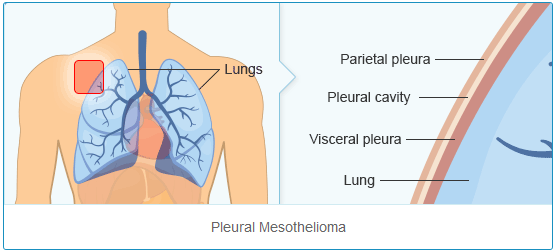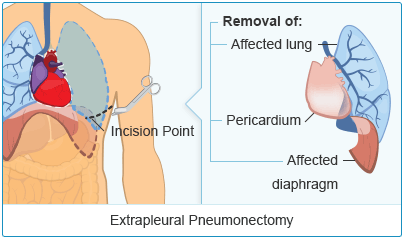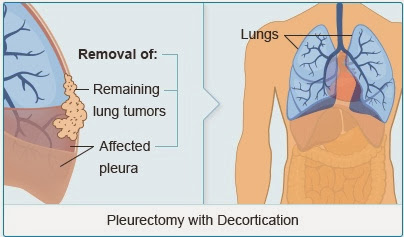Pleural Mesothelioma
Pleural Mesothelioma is a form of cancer in the pleura (protective lining of the lung). It is caused by exposure to asbestos fibers.Overview Pleural Mesothelioma
Pleural mesothelioma is the most common form of mesothelioma and makes up 75% of all mesothelioma diagnoses. It develops when asbestos fibers are inhaled and attach to the lining of the lungs, known as the pleura. This can include both the visceral (inner) or the parietal (outer) pleura. The particles irritate the pleura, resulting in inflammation. The pleural tissue develops into scar tissue, which can cause genetic damage and tumors. It takes anywhere from ten to fifty years after asbestos exposure for mesothelioma to develop in the pleura.
Mesothelioma in the pleura spreads quickly because of its proximity to vital organs. Generally, it develops in the lining of the lungs and then spreads to the rest of the lung, the chest wall, or the nearby diaphragm. The central location of the lungs in the body means the other vital organs are nearby.
Mesothelioma in the pleural space can metastasize to the lymph nodes, which can cause cancer to spread throughout the body more quickly. It is common for it to metastasize to the central organs. There have also been cases which linked pleural mesothelioma to spread to the brain, although this is uncommon.
Fighting pleural mesothelioma takes a mix of information an action. Our free Mesothelioma Guide puts the power in your hands to find a top pleural mesothelioma specialist as well as which treatment options work best.
Symptoms Pleural Mesothelioma
Prior to a pleural mesothelioma diagnosis, patients may experience symptoms associated with common illnesses, such as the onset of a fever, shortness of breath or coughing. Although these symptoms are common, if a patient has been exposed to asbestos in the past, it is important they consult a physician.
- Lower Back Pain
- Shortness of Breath (dyspnea)
- Unexplained Weight Loss
- Swelling of Face or Arms
- Fluid Buildup (Pleural Effusion)
- Chest Pain (Pleurisy)
- Dry or Painful Cough
- Fever or Sweating
- Tissue Lumps in the Chest
- Coughing up Blood (Hemoptysis)
Causes Pleural Mesothelioma
The main cause of mesothelioma is exposure to asbestos fibers. Asbestos products are usually found in homes and businesses built prior to the 1980’s. Occupational exposure is the most common form, although exposure in the home can occur as well. Genetic factors may also play a role in the development of mesothelioma. However, this connection has not been fully investigated. The genetic links may actually be sourced to common exposure to asbestos-related environments.
Veterans with Mesothelioma
The largest group diagnosed with mesothelioma are military veterans, specifically Navy service members. Asbestos was commonly used because of its flame-resistant qualities. Millions of veterans were exposed between the years 1930 and 1980. Veterans diagnosed with mesothelioma can work with our team (including a retired Lieutenant Commander) to get help filing a VA Claim. There are options available for those who served our country.
Diagnosis Pleural Mesothelioma
If test results determine the possible presence of cancerous tumors or growths, doctors perform a biopsy on the area. A biopsy is a small fluid or tissue sample that determines if cancer cells are present. Tissue biopsies are the most reliable, with a 96% conclusivity. Depending on the results of the biopsy and if the cancer has spread, a patient is diagnosed with a specific stage of pleural mesothelioma. The stages range from 1 to 4.
The 4 Stages:
- Stage 1
- The cancer is only located in the pleural lining of the lungs.
- Stage 2
- The cancer has spread to more of the lung, part of the diaphragm, and localized lymph nodes.
- Stage 3
- The cancer has metastasized to nearby organs and mroe lymph nodes
- Stage 4
- The cancer has spread to the other organs and all lymph nodes are fully involved.
Treatment Debate of Pleural Mesothelioma
Treatment Options for pleural mesothelioma are dependent upon which stage a patient is diagnosed with. Patients with earlier stages of pleural mesothelioma are usually candidates for curative surgeries like an extrapleural pneumonectomy or a pleurectomy. Patients who are in the later stages of mesothelioma may receive more palliative treatment options, such as a pleurodesis, to help alleviate the discomfort caused by the tumors.
There is a current debate between the effectiveness of an extrapleural pneumonectomy (EPP) versus a pleurectomy. The EPP surgery was initially developed for mesothelioma by Dr. David Sugarbaker at Brigham and Women’s Hospital in Boston, MA. An EPP removes the entire lung, part of the pericardium, and part of the diaphragm – all the areas the mesothelioma has metastasized to during advanced stage 2 mesothelioma. There have been many successful EPP surgeries. Patients’ survival rate dramatically increases and there have been cases of patients living over fifteen years after having the EPP surgery.
Dr. Robert Cameron is the original developer of the pleurectomy surgery and is the most outspoken critic of the extrapleural pneumonectomy. He has stated that the pleurectomy is the better surgery for patients because it is a lung sparing surgery with lower mortality rates. A pleurectomy may sometimes include removal of part of the lung, but not the entire lung. Rarely does a pleurectomy remove all the affected areas of stage 2 pleural mesothelioma due to the intricate spread. According to him, the quality of life of a pleurectomy patient is better than one who had an extrapleural pneumontectomy. Although the pleurectomy has a lower mortality rate, treatment plans may involve different surgical procedures depending on the patient’s unique diagnosis.
Since finding a doctor is one of the most critical steps a patient can take, we developed a resource to assist with it. Our free Doctor Match program connects patients with pleural mesothelioma specialists across the nation. We’ve built relationships across the country with the very best mesothelioma specialists and place patients with a doctor who is best able to treat them.
Surgery Extrapleural Pneumonectomy (EPP)
Extrapleural Pneumonectomy Mesothelioma Surgery TreatmentExtrapleural pneumonectomy is the most common surgical treatment for stage 1 or 2 malignant pleural mesothelioma. During EPP, a surgeon removes the diseased lung as well as the pleural space covering the lung, heart, and diaphragm.
The goal of EPP is to remove as much, if not all, of the cancerous tissue possible. Chemotherapy may be used as a pre-surgery (neoadjuvant) precaution to shrink the tumors and may also be recommended post-surgery (adjuvant). Dr. David Sugarbaker, of Brigham & Women’s Hospital, is the creator of the EPP and is one of the leading mesothelioma physicians in the country.
Pleurectomy/Decortication (P/D)
Pleurectomy with Decortication Mesothelioma Surgery TreatmentPleurectomy with decortication may be used in stage 1 mesothelioma to remove the cancerous pleura. It also may be used in stages 3 or 4 to alleviate pain while breathing because the lung cannot expand entirely.
Pleurectomy with decortication helps patients ease in breathing and controls the fluid build-up that generally happens in the pleural space. Tumors on the surface of the lung are also removed. Palliative surgeries are done to relieve any pain the patient may be experiencing and improve their quality of life.
Secondary Treatments Pleural Mesothelioma
Chemotherapy
Currently, the most effective form of chemotherapy given to pleural mesothelioma patients is the combination of pemetrexed (Alimta) and cisplatin (Platinol). This combination is the standard for chemotherapy treatment and is given to all pleural mesothelioma patients. Pemetrexed is the only medication of its kind approved by the FDA to specifically treat mesothelioma. Doctors may also use drugs not yet been approved to treat mesothelioma patients.
Another form of chemotherapy given to pleural mesothelioma patients is known as intrapleural chemotherapy. This process involves a catheter which applies the chemotherapy directly to the tumor site. This technique is only used in stage 1 patients because the cancer has only spread to the pleura.
Radiation
For mesothelioma patients, radiation techniques are rarely curative when used on their own. Radiation may be used before or after surgery, such as an extrapleural pnuemonectomy. Radiation used after surgery has shown to greatly reduce the possibility of cancer recurrence.
Radiation is not usually used in the later stages of pleural mesothelioma because it has spread to other parts of the body. The only instance in which radiation would be used would be for palliative purposes. There may be chest discomfort due to fluid build up or tumor pressure, in these circumstances, radiation may be used. The radiation may help with tumor pressure because it shrinks the tumor to alleviate the pain.
Patients looking for a complete pleural mesothelioma treatment plan (including chemotherapy and radiation treatments) should visit Cancer Center Guide
Prognosis
There are many factors that play a role in a patient’s prognosis. The cell type, stage, age, and overall health of the patients are all important. In pleural mesothelioma cases women have a better survival rate than men.
One study done by Dr. David Sugarbaker showed there was a five year (or more) survival rate in patients diagnosed with pleural mesothelioma. These patients had epithelioid cell types and no lymph node involvement (stage 1). The patients underwent an extrapleural pneumonectomy which removed most of the cancer cells. The outlook of treating pleural mesothelioma is getting brighter as more research is being done.
Rarely does a pleurectomy remove all the affected areas of stage 2 pleural mesothelioma due to the intricate spread. Early treatment is key in the prognosis of mesothelioma. The earlier the cancer is detected, the sooner treatment can begin. Patients who are fighting pleural mesothelioma can learn a lot from mesothelioma survivors. Their stories of hope prove that its possible to live beyond a prognosis.
source: http://urdoctor-info.blogspot.com/2013/10/pleural-mesothelioma.html








0 comments: